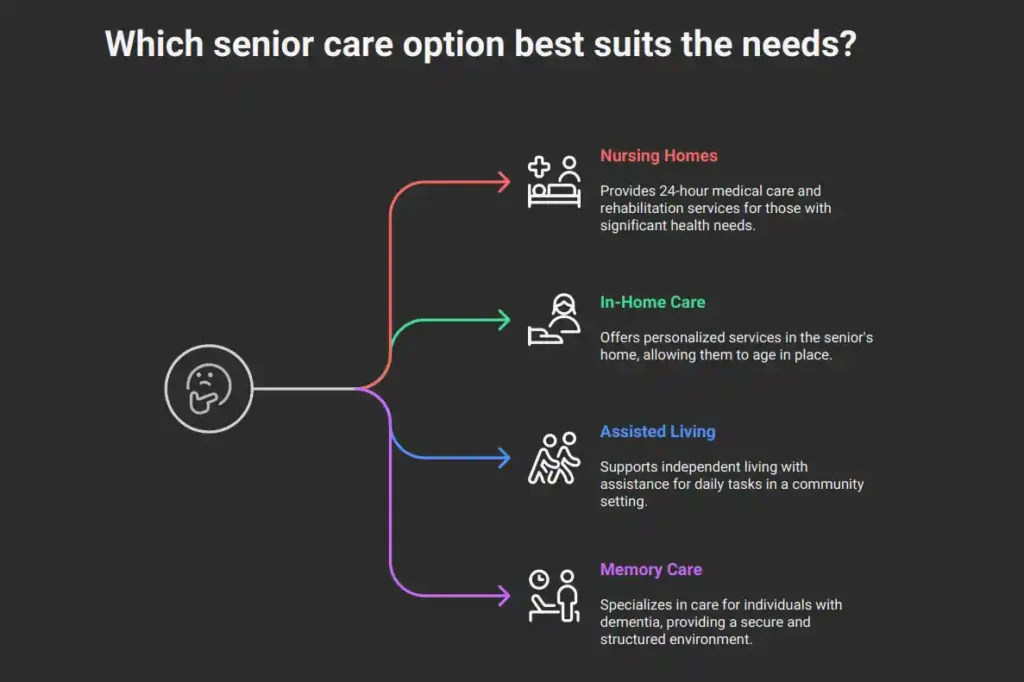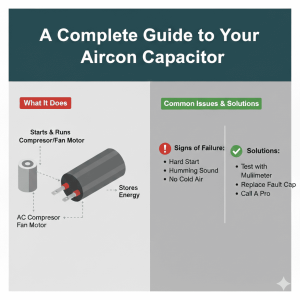Families often face a period of significant emotional weight and complexity when a loved one’s care needs begin to increase. The process of exploring different care options, understanding their nuances, and ultimately making a decision can feel overwhelming. It is crucial to remember that embarking on this journey is an act of love and profound responsibility.
The term “Senior Care” itself is broad, encompassing a wide spectrum of services and living arrangements that extend far beyond the traditional concept of a nursing home. Recognizing this diversity is the first step toward finding a solution that truly aligns with an individual’s specific needs, preferences, and circumstances. Many families find themselves navigating these decisions during times of crisis, such as after a sudden illness or a fall, which can add to the pressure.
The term “nursing home” can sometimes carry historical, negative connotations, potentially creating an emotional barrier to objective decision-making. It is important to approach this topic with an open mind, understanding that modern nursing homes, often referred to as Skilled Nursing Facilities, play a vital role in providing necessary medical care that other settings may not be equipped to offer.
What Are My Senior Care Options?

Navigating the world of senior care requires a clear understanding of the different types of facilities and services available. Each option caters to distinct needs, offers varying levels of medical care and support, and provides a unique living environment.
Nursing Homes and Skilled Nursing Facilities
Nursing Homes and Skilled Nursing Facilities are residential facilities designed to provide 24-hour care for individuals who require a high level of medical attention and assistance with daily living. The defining characteristic of nursing homes is the high level of medical care they provide. This includes 24-hour medical support, skilled nursing services delivered by licensed nurses, and comprehensive rehabilitation services such as physical, occupational, and speech therapy.
Nursing homes are best suited for individuals with significant health care needs. This includes those recovering from major surgery, a stroke, or a severe illness requiring intensive rehabilitation. They also serve individuals with chronic medical conditions that demand constant skilled monitoring and care, people with substantial physical disabilities who need extensive help with activities of daily living, or those with cognitive impairments like advanced dementia who also have complex medical needs.
In-Home Care: Aging in Place
In-Home Care encompasses a wide range of supportive services provided directly in a senior’s own residence, allowing them to “age in place.” These services can vary from non-medical assistance, such as companionship, meal preparation, light housekeeping, and help with daily activities, to skilled nursing care delivered by licensed health professionals.
This option is ideal for seniors who wish to remain in the comfort and familiarity of their own homes and whose care needs can be safely and effectively met in that setting. A key advantage of in-home care is its high degree of flexibility and personalization. Care plans can be tailored precisely to an individual’s specific needs, preferences, and schedule.
Assisted Living Facilities
Assisted Living Facilities are a housing option for seniors who need assistance with daily activities but do not require the intensive, 24-hour skilled medical care provided in nursing homes. The philosophy of assisted living emphasizes resident independence, choice, dignity, and social engagement within a supportive, residential community setting.
These facilities are well-suited for seniors who are largely independent but require some level of help with daily tasks such as bathing, dressing, medication management, and meal preparation. This option is also beneficial for those seeking relief from the burdens of home maintenance and a desire for a built-in social network and activity programs.
Memory Care Specialization
Memory Care is a specialized form of long-term care specifically designed for individuals living with Alzheimer’s disease or other forms of dementia. These programs provide 24-hour supervised care within a secure and structured environment tailored to the unique needs of those with cognitive decline.
Memory care environments incorporate several distinct features including secure environment with alarmed entrances and exits, dementia-friendly design with layouts designed to minimize confusion, specially trained staff who receive training in dementia communication techniques, tailored activities that focus on cognitive stimulation, and structured routines with consistent daily schedules.
How Do These Care Options Compare?
Making an informed decision requires a direct comparison of the primary care options across several critical dimensions.
Level of Medical Care and Supervision varies significantly across options. Nursing homes offer the highest level of medical care with 24/7 skilled nursing services, regular physician oversight, and management of complex medical conditions. Memory care provides specialized medical oversight focused on dementia-related health issues with 24/7 supervision by staff trained specifically in dementia care. Assisted living offers basic health monitoring, medication reminders, and coordination with external healthcare providers, while in-home care can range from no medical care to intermittent skilled nursing care provided by licensed professionals.
Assistance with Activities of Daily Living also differs across settings. Nursing homes provide comprehensive assistance with all daily activities including bathing, dressing, eating, toileting, and mobility. Memory care offers extensive help with daily activities using specialized approaches that accommodate cognitive impairments. Assisted living provides tailored assistance based on individual needs, promoting independence where possible, while in-home care offers customized assistance within the person’s own home environment.
Living Environment and Social Life present different experiences. Nursing homes tend to have a more institutional environment due to their medical focus, with rooms that can be private or semi-private. Memory care features a secure, specially designed environment aimed at reducing confusion and promoting safety, with structured therapeutic activities. Assisted living offers a residential, apartment-style living experience with strong emphasis on community and social engagement. In-home care provides the familiar home environment but may risk social isolation without proactive community involvement.
Independence and Autonomy levels vary considerably. Nursing homes typically have more structured daily routines due to intensive medical needs, resulting in less autonomy for residents. Memory care allows autonomy within a secured setting with structured routines for well-being. Assisted living actively promotes resident independence with more control over daily schedules and activities. In-home care offers the maximum level of independence and control over personal environment and routines.
What Will Senior Care Cost Me?
The cost of senior care is a significant factor in the decision-making process for most families. Understanding the typical expenses associated with each type of care and the available payment options is crucial for sustainable planning.
Cost Overview by Care Type shows significant variation. In-home care costs are calculated hourly, with national median costs for home health aides ranging from $5,700 to $6,300 monthly for about 44 hours per week. For 24/7 in-home care, costs can reach approximately $21,800 per month. Assisted living facilities average between $4,500 and $5,900 monthly for base services, with additional charges for higher levels of care. Memory care typically costs 20-30% more than standard assisted living, ranging from $5,000 to $7,000+ monthly due to specialized staffing and programming. Nursing homes are generally the most expensive option, with national averages around $9,000-$9,500 monthly for semi-private rooms and $10,000-$11,000+ for private rooms.
Payment Options include several sources. Private pay involves using personal financial resources such as savings, investments, retirement funds, or proceeds from asset sales. This is the most common method for funding assisted living, memory care, and non-medical in-home care services.
Medicare provides limited coverage for long-term care. For nursing homes, Medicare Part A may cover care in certified facilities for up to 100 days per benefit period if specific conditions are met, including a qualifying hospital stay and documented need for skilled care. However, Medicare does not cover long-term custodial care if that is the only care needed.
Medicaid serves as a primary payer for long-term nursing home care for individuals meeting strict financial eligibility criteria. Many states offer Home and Community-Based Services waiver programs that can help pay for personal care services in settings like assisted living or in homes, though availability and criteria vary significantly by state.
How Do I Ensure Quality Care?
Understanding how different care settings are regulated and what indicators of quality to look for can help families make more confident choices.
Regulation and Licensing varies by care type. Nursing homes accepting Medicare or Medicaid are subject to federal regulations and undergo annual unannounced inspections to ensure compliance. Assisted living facilities are primarily licensed and regulated at the state level, meaning standards can vary considerably. In-home care agencies have different licensing requirements by state, with Medicare-certified home health agencies meeting federal standards.
Quality Indicators help assess care standards. For nursing homes, Medicare’s Care Compare website provides Five-Star Quality Rating Systems and detailed inspection reports. For assisted living facilities, families should inquire about staff qualifications, training programs, staff-to-resident ratios, and resident satisfaction surveys. Memory care quality includes comprehensive dementia-specific training, thoughtfully designed environments, robust therapeutic activity programs, and evidence of low staff turnover.
The Importance of Visits and Questions cannot be overstated. Personal observation through facility visits at different times provides insights that formal reports cannot capture. Families should pay attention to staff-resident interactions, cleanliness, resident engagement levels, and overall atmosphere during these visits.
How Do I Make the Right Choice?

Choosing the most appropriate care setting requires careful consideration of many factors through a step-by-step approach.
Assessing Your Loved One’s Needs forms the foundation of decision-making. This evaluation should cover medical conditions and care requirements, including current diagnoses, medications, and any skilled nursing procedures needed. Activities of daily living must be assessed to determine assistance levels needed for bathing, dressing, eating, toileting, and mobility. Cognitive function evaluation looks for signs of memory loss, confusion, or judgment difficulties that might necessitate specialized memory care.
Involving Your Loved One in the decision-making process is crucial whenever possible. Early conversations about future care needs, approached with empathy and patience, help ensure their preferences are considered. Presenting various options and discussing pros and cons in relation to their needs and preferences leads to more successful transitions.
Researching and Visiting Options requires utilizing multiple information sources including the Eldercare Locator, Medicare’s Care Compare website, state licensing agencies, and healthcare professional referrals. In-person visits to potential facilities at different times provide essential insights into daily operations and care quality.
The ultimate goal in this process is to enhance your loved one’s safety, promote their well-being, and ensure they receive the support necessary to maintain the best possible quality of life. The decision should be grounded in comprehensive understanding of what each option offers and how it aligns with specific requirements identified through thorough needs assessment. Remember that this choice is not just about finding a place or service, but ensuring ongoing quality of care and advocating for your loved one’s best interests.
Finding Peace of Mind in Your Decision
Choosing the right senior care option for a loved one is one of the most significant and challenging decisions a family can make. There is no single “correct” answer, as the most suitable choice depends on unique needs, preferences, financial circumstances, and family values.
The ultimate goal is to enhance your loved one’s safety, promote their well-being, and ensure they receive necessary support to maintain the best possible quality of life in an appropriate and compassionate environment. Whether the path leads to in-home care, assisted living, specialized memory care, or a nursing home, the decision should be grounded in comprehensive understanding of what each option offers.
Once due diligence has been performed through needs assessment, option research, facility visits, and financial consideration, families should feel empowered to make a choice. Trusting your research and instincts, combined with open communication with your loved one, can lead to a decision that brings peace of mind.
Remember that your involvement does not end with the initial decision; it evolves into a new phase of support and advocacy. By approaching this decision with diligence, empathy, and commitment to your loved one’s welfare, you are undertaking a profound act of care and dedication that honors their dignity while ensuring their safety and well-being.
Ready to help your loved one age safely at home?
Helpling Singapore offers personalized part-time elderly care with family-like caregivers who provide comprehensive support beyond just caregiving. From medication assistance to light housekeeping, our flexible 8am-10pm scheduling adapts to your family’s needs. Experience bespoke companion matching and professional care planning that keeps your loved one comfortable, active, and cherished in familiar surroundings. Learn more about our elderly care Singapore services and book your consultation today.






